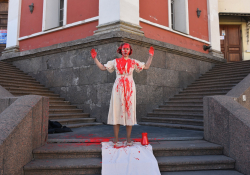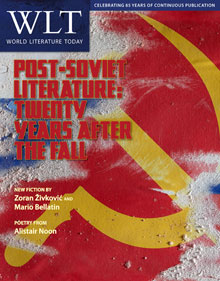Poetry in the Cloud: An Experiment, Results, and n+1 Hypotheses
The seven poems published on the following pages are the offspring of a happy, twenty-first century union—between the ancient art of poetry and the Internet. In March 2011 twenty or so Russian and American poets, scholars, and translators assembled virtually—via a document cloud—to work on new translations from Russian into English and vice versa. This group brought together individuals from across the eastern seaboard of the United States and from locations in Russia stretching from Kaliningrad, Russia's outpost in Eastern Europe, to Novosibirsk in Russia's Asian expanses. Two months later, with drafts of some fifty poems in our virtual hands, this group gathered physically in Philadelphia to polish these translations at a symposium entitled "Your Language—My Ear," sponsored by the New York–based cultural exchange organization CEC Artslink and the University of Pennsylvania.
The results are far more extensive than anything that could have come about without the Internet run-up to the symposium, and they are far more refined than what could have been produced by translators working in isolation. To state a banal truth: rendering a poem in another language is tricky business—a form of literary interpretation. You may think you've produced a beautiful, clever translation that gets at the essence of the poem. Yet there's nothing like sitting down with the poet in person, along with two or three other kibitzing translators, to teach you how much further the translation has to go to achieve something like adequacy to the original and strength as a poem in its own right. Thankfully, we had the gift of sunny days and warm nights to pursue this process—at times agonizing, at times elating—during walks through Philadelphia, over coffee in Kelly Writers House, and with grilled food in Penn's Quad. Bilingual readings at Robin's Bookstore, Wooden Shoe Books, and on Penn's campus allowed us to test-drive our translations before audiences. The poems that follow are only a small part of what we produced; other poems are appearing in other venues.
The translation process I've described above provides an illustration—somewhat tangential—of the major axiom of my essay: that the great utility of the Internet for poetry is nowhere more apparent than in Russian poetic life. Fifteen years ago, we were told that the World Wide Web would liberate people from geography by linking distant individuals together into virtual communities. Although this has certainly not come to pass for every community one could imagine, the world of Russian poetry is one of the notable success stories. To a far greater degree than is the case in the anglophone poetry world, readers are only about two clicks away from the majority of texts of almost any russophone poet, historical or contemporary, no matter whether they live(d) in Moscow or in Rome.
Moreover, our intercontinental cloud-translation experiment can be seen as something like a synecdoche for Russian poetry's general state of being. Over the past decade, Russia has seen the emergence of a robust landscape of free online poetry journals. Print journals are generally available with open access online after minimal delay. Even books of poetry commonly appear online soon after they are printed; poetry bloggers appropriate and comment upon all of this work as soon as it appears on LiveJournal and other blogging sites. (LiveJournal is among the most vibrant social networking tools in Russia, perhaps because it encourages really extensive posts, re-creating something of the atmosphere of late-night conversations over tea in an intellectual's kitchen—Russians have always preferred discoursing to tweeting.) Things have progressed to the point that there are now important contemporary Russian poets who do not, as a matter of principle, publish apart from on the web. All the poets presented here have significant web presence. Feodor Swarovski, in particular, has a remarkably large following on the web—in part reflecting the attraction of his science-fiction themes for a tech-enabled generation, one suspects.
How did this state of affairs come about? The Russian pCloud is in many ways an accidental yet happy consequence of the weakness of traditional literary institutions following the breakup of the Soviet Union. Since the demise of the Soviet book market, mechanisms for distribution of books have functioned poorly if at all across Russia's huge territory—especially for limited-edition publications. Russia's legal institutions are plagued by corruption, resulting in a notably lax enforcement of intellectual property laws. And in Russia poets are resigned, perhaps more so than anywhere else, to the global reality that no one is going to make much money selling poetry anyhow. Independent of these local Russian conditions, one may also add that in terms of scale, of all literary genres poetry is best suited for electronic distribution and consumption. Just as eBay was the apotheosis of small-scale commerce, connecting buyers and sellers in a frictionless new dimension of capitalism, the Internet has emerged in Russia's peculiar post-Soviet conditions as a perfect mechanism for small-scale literature, connecting poets and audiences in a space lying beyond the geographical.
Undoubtedly, the poetosphere has been one of the major factors in the efflorescence of Russian poetry as a whole over the past decade. During the 1990s, the Russian poetry scene was by and large populated by the last generations of Soviet writers—including some officially recognized Soviet poets, such as Bella Akhmadulina, but perhaps dominated by poets who had emerged from the underground, like Dmitry Prigov or Olga Sedakova. In those years, poetic life suffered from the degradation of Soviet literature's "imperial" syndrome: as a result of the breakdown of Soviet cultural institutions and communication circuits, Moscow and St. Petersburg had been transformed from extraordinarily privileged sites of cultural production into isolated mountaintops, still convinced of their own importance but generally disconnected from Russia's larger publics. In those days, both the post-Soviet generation of poets and a few Internet literary projects—most notably the web portal "Vavilon" created by the initiative of Moscow poet and kulturträger Dmitry Kuzmin—had as yet attracted few "users." At the end of the 1990s, Internet access was still limited to some 5 percent of the Russian population, largely located in those same two cities. Now, as a direct result of electronic communication, the situation is changed. Simply put, Russia is graced with many, many fresh poetic voices, and Russians everywhere are writing and reading a lot of new poetry.
However, I do not want to claim that the Internet is the only or even the most important mode of contact in Russia's new poetic era. As was the case in the translation process of "Your Language—My Ear," poetry thrives on the immediacy of physical presence and human contact. Nuance is easily lost in clouds. The Internet, then, should be seen only as a powerful new catalyst for poetic activity in other registers, rather than as a replacement for traditional modes. Reflecting this "Internet dating" principle, poetic life in Russia is supported by a large and growing number of regional poetry festivals that, like our symposium, physically unite poets and audiences whose first encounter was virtual. The poetry reading and the printed book are far from a thing of the past. And I suspect that, in Russia at least, the Internet dissemination of poetry ultimately plays out in an increase in sales of physical books to audiences who would not otherwise encounter the authors in question.
Yet another consequence of the online turbocharging of Russia's poetic life is its ascent "above the barriers" (to borrow a line from Pasternak). In general, national boundaries are effaced in virtual space, despite the efforts of nervous governments around the globe to challenge this principle. Here, too, the translation experiment of "Your Language—My Ear" serves as a synecdoche for the overall picture of Russian poetic culture. Consider, for a start, that among the Russian poets presented here are three who live in Latvia—Semyon Khanin, Artur Punte, and Sergej Timofejev.
Latvia is one of the many former Soviet republics in which the collapse of the USSR left behind a significant population of ethnic Russians and other ethnic minorities for whom Russian is either a first language or second nature. This patchwork of Russian populations scattered across the Baltic, the Caucasus, Eastern Europe, and Central Asia is not, strictly speaking, a diaspora, given that in many cases these regions have been home to significant numbers of Russians for decades or centuries. It is, rather, a transnational population sprawl. The Russian population of Latvia is a large and coherent fragment of Russian society, located by a twist of history in a small, northern European state.
The Russian poetosphere includes on an equal footing an extended network of voices and readers from such exo-territories of Russian cultural space, along with those of the global diaspora in the more traditional sense. And in this latter connection, our team of American translators included several individuals who could be described as members of the Russian or post-Soviet diaspora—Polina Barskova, Eugene Ostashevsky, Valeria Tsygankova, and Maya Vinokour, whose biographies reflect various waves of emigration and various modes and degrees of cultural integration into American society. Via the Internet, one might suggest, Russian poetic life is experiencing a postnational or global turn.
In relation to this postnational turn, we may observe once again that virtual space has not so much replaced physical geography as supplemented it. Russian poetry may be subdivided into regional schools and tendencies that attest to the continuing significance of physical proximity and local cultures. Khanin, Punte, and Timofejev, for example, are the founding members of a poetic organization based in Riga called Orbita (www.orbita.lv). They often perform together in group readings, and their work is clearly marked by regional specificity. Largely publishing poetry in bilingual Russian-Latvian editions and frequently publishing essays and other forms in Latvian, Orbita is a bicultural project. Performances—advertised on the group's web portal and via social media—often involve ambient noise and collaborations with musicians or visual artists. Orbita's members write largely in free verse, distinct from the tendency of Russian poetry elsewhere toward forms involving meter and rhyme.
This dominant tendency is exemplified by the works of several of the other poets offered here—Igor Belov, Viktor Ivaniv, and Ksenia Shcherbino. (Some of these distinctions are, unavoidably, lost in the translations that follow, which preserve semantic accuracy over rhyme in almost all cases; the stanzaic and rhythmic patterns of the originals, however, are by and large reflected in the translations.) The work of these poets, too, expresses regional specificities—whether in the form of Belov's homage to fellow Baltic author Astrid Lindgren, Shcherbino's Moscow urban chic, or Ivaniv's shamanistic exaltation.
Yet in order to temper (slightly) the technological exuberance of this discussion, I should note that the Russian poetosphere is far from a global anarcho-literary utopia. In an echo of economic and political realities, the web reflects something of physical geography's division into peripheries and centers of power. Given that the most influential Russian poetry journals and portals emanate from Moscow and St. Petersburg, it might be fair to say that the Internet has made possible a partial reassembly, regardless of the political fragmentation of former Soviet geography, of a hierarchically structured literary empire with Moscow's money and cultural institutions at its center.
One Moscow-based Internet project in particular, the New Literary Map of Russia (www.litkarta.ru), makes this its explicit aim. This is a geographically structured catalog of contemporary russophone literary activity devoted, as its masthead explains, to the "reconstruction of the wholeness of Russian literary space." On the map that figures on its home-page, major Russian cities are shown as black points in gradations of scale. Moscow is represented by a larger, red dot.
However, truth be told, it's well nigh im-possible to control the Internet. Even more so lyric poetry.
And I doubt that many people in Moscow are really fretting much about accomplishing the latter. With each year, Russia is home to more and more competing poetry portals, web journals, and fan sites, relating to the most varied of physical geographies. In place of the traditional Soviet organization of literary value, in which all activity was stacked in a single pyramidal hierarchy that reached its peak in Moscow, circulation of poetry in Russia today brings to mind the computing principle of n+1 redundancy, according to which any given circuit is replaced by another in the event of failure. Think spiderweb rather than pyramid.
Which is to say that there's no predicting where the next-generation Internet will take the poetosphere, in Russia or elsewhere. Remote access to voice, sound, and image are more and more commonplace. Among engineers and linguists working on automated translation, a favorite experiment is to run poetry through the machine and see how well things turn out. Generally, the resulting translations are not so convincing—so far. Clearly, just as Deep Blue came to chess and Watson came to Jeopardy, the day of Compushkin will come for poetry.
Unfortunately but perhaps irreversibly, poetry is rapidly losing its place as a compulsory aspect of general education across the globe. It is being transformed from Culture plain and simple (with a capital "C") into "a subculture." The Russian case shows that the Internet has the potential to link together enclaves of this poetic subculture, from Vancouver to Vladivostok, in a global archipelago of the word.
University of Pennsylvania
Editorial note: View video clips of some of Orbita's performance poetry in this web exclusive.













